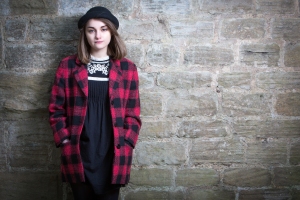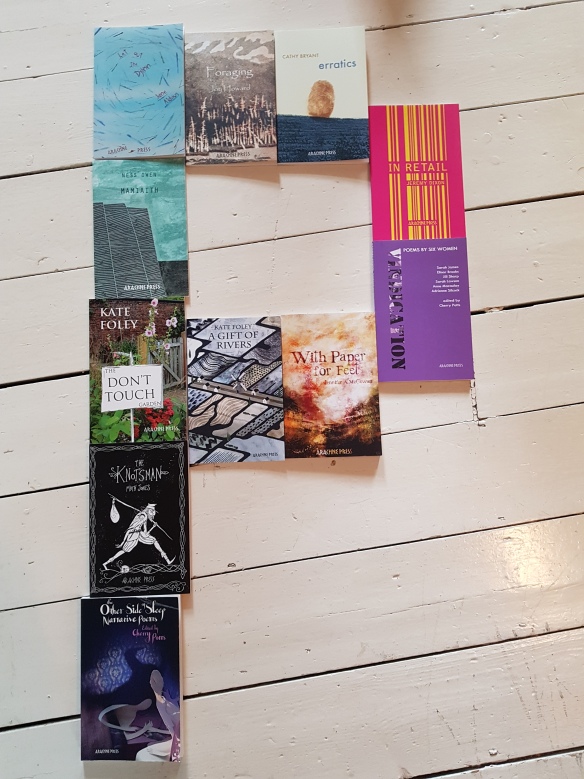
Poet Jenny Mitchell (Time and Tide) interviewed by Emma Lee, (The Significance of a Dress, The Other Side of Sleep, Story Cities, Time and Tide, No Spider Harmed in the Making of this Book)

Emma: How did you start writing and what drew you to poetry?
Jenny: I’ve been writing since I was a child, drawn to telling as many stories as I could in as short an amount of time as possible. Luckily, the English teachers at my secondary school were extremely encouraging when they saw how much I liked to read. The deputy head, Ann Taylor, was an outstanding teacher who allowed me to show her my poems whenever I liked. It was really encouraging and wonderful.
Another teacher, Gaynor Macdonald, was also very good. Her husband, George Hartley, published The Less Deceived by Philip Larkin (this will be my only name drop – promise!). Gaynor and George helped me to develop my love of writing.
Emma: At the Time and Tide festival in Greenwich, your poem, Church Mary Sounds the Sea, was read by Grace Cookey-Gam. How did it feel to hear your poem read by someone else?
Jenny: I found Grace’s reading extremely moving, and I’d love to work with more actors to bring my poems alive.
I was also really moved when Grace asked me if Church Mary was based on a real person. I love that the poem seemed so alive to her, and it inspired me to write another poem which includes a grave for Church Mary. Despite this, I continue to write about her because she seems like a powerful character with a lot of wisdom.
Emma: Your poem, Church Mary Sounds the Sea in the ‘Time and Tide’ anthology explores how important it is to bear witness. How important is it to keep the memory of slavery and injustices alive? Do you think the history of slavery should be part of the National Curriculum?
Jenny: I don’t know whether it is or not. There was a lot of work being done to commemorate the 200th anniversary of the abolition of the slave trade in 2007. However, I think the history, as told in museums etc, often creates a picture of poor, downtrodden black people who were freed by noble white men like Wilberforce. This distortion denies the agency and power of black people and their/our role in fighting for freedom.
I felt so starved of nuanced information about the history that I spent five years doing my own research, reading lots of books and examining archives. One of the most influential books for me was Natural Rebels by Sir Hilary Beckles.
Once I’d done this research, my main aim as a writer became to transform the history and ‘give voice’ to those who were silenced but not destroyed.
Emma: Towards the end of Church Mary Sounds the Sea, you use the image of ‘real strength lies beneath our surface’, implying that, despite the attempts of ‘slave owners’ to dehumanise the enslaved, the image suggests they have not lost their humanity. Do you think it’s important to re-humanise those who were made slaves?
Jenny: I don’t think enslaved people were ever not human. I think white ‘slave owners’ attempted to take away their humanity using unspeakable violence and oppression. This attempt to dehumanise is at the heart of any narrative that suggests white abolitionists were the ones who freed black people. It denies agency and the natural desire to be free.
It might also be the foundation on which racism is built, the idea that white people are the human beings with power and everyone else is somehow ‘other’, powerless and beneath them.
I’d like to reiterate that in writing about what I perceive to be the legacies of British transatlantic enslavement, I’m not just talking about black people. I think the entire structure of white ‘patriarchy’ is a legacy, including its continued economic, physical and psychic violence towards black people.
Emma: Your poem Her Lost Language begins: “English mouths are made of cloth/ stitched, pulled apart with every word”. How important is the imagery of clothes to your work?
Jenny: I seem to use clothes as a way to talk about identity, history and emotions. I think that for women, and black women in particular, clothes were and are used to signify so much – status, worth etc.
Emma: The metaphors in Eve’s Lost Daughter suggest the damage of a woman’s clothes is a reflection of her alleged madness, but the advice at the end of the poem is for her to take her damaged clothes and escape. You’ve mentioned elsewhere the intergenerational traumas that arise for descendants of slaves, and a reading of Eve’s Lost Daughter could be that she takes her inherited damage with her even as she escapes captivity. Is this an important theme in your work?
Jenny: Thank you for your interpretation. Firstly, to clarify, I think intergenerational trauma regarding enslavement is something that impacts white people as much as it does black people, for obvious reasons but in very different ways.
I’m sure you know that sometimes you just write ‘instinctively’ without going into deep thought about what it means to you or to others. But your interpretations of my poems definitely get to the heart of my beliefs. Yes, I think we carry all of our past within us until we do the work to heal/transform it. I believe that poetry or any creative endeavour can be a form of personal alchemy.
Emma: In Song for a Former Slave you use the metaphor, ‘her dress is made of music’ and in this poem the subject’s clothes represent freedom, yet women’s clothes are more usually described in terms of their restrictions. What inspired you to subvert this norm or surprise readers in going against convention?
Jenny: Perhaps clothes mean different things to us depending on our histories/cultures. Also, I think poems should subvert and surprise, if only because that reminds us of how restrictive the norms can be.
Emma: These poems are in direct contrast to Black Men Should Wear Colour which has a distinctly celebratory note throughout in a list of flamboyance. How free do you think people should be to choose their own clothes, or it is too easy for people to go with a default suit for work, jeans/sweats for casual wear and not really think about what they are wearing?
Jenny: I wonder if being really free to choose the way we dress would lead to more freedom and a surer sense of identity?
In the case of Black Men Should Wear Colour, I wrote it after looking out of my window and seeing a black man in really bright clothes. It reminded me of my short time living in Senegal where I saw men in the most amazing colours. They looked so alive, in contrast to the way so many black men dress in the UK. I believe it might be a sort of camouflage, not wanting to stand out in a country where there might be hostility/envy from so many quarters.
In Samuel Selvon’s seminal book, ‘The Lonely Londoners’, he describes black men in the ‘50s who are dressed in bright colours as being not quite ‘respectable’. I’ve also heard that this was one of the things that was said to denigrate people coming from the Caribbean after the 2nd World War. They were mocked for dressing in banana-coloured clothes etc. It’s obviously meant to be a racist slur but I think it’s interesting that (the vibrancy of) clothes should be singled out.
Emma: What projects are you working on right now?
Jenny: I’m drafting my second collection called Map of a Plantation. The poems are challenging because of the subject matter, not necessarily the form. But it feels like something I have to do.
Later in the year, I’ll be working with Floe Press as Guest Editor of their poetry blog.
Emma: What are you currently reading?
Jenny: I tend to read lots of individual poems during the day, but I think of it as part of my ‘education’.
In order to relax I’ve started reading massive biographies again, currently Mad Pilgrimage of the Flesh by John Lahr, about Tennessee Williams.
Emma: Are there any writing advice or tips you’d like to pass on?
Jenny: Perhaps if you’re a member of a writing group practise writing down any feedback about your poems instead of answering it verbally. I find this is a helpful way not to get trapped into justifying or defending work. It also means I can go away and look at what’s been said and winkle out anything that might be useful.
Emma: What question would you have liked to answer?
Jenny: think I’d have liked to be asked: when are you next performing in Rome? And for me to be able to give you a concrete date. Soon, I hope…
You can buy all the Arachne books mentioned from our webshop, we will post them out to you.
If you would prefer eBooks, all these books are available from your usual retailer. we recommend Hive for ePub.
Preorder No Spider Harmed… – out 8th August 2020 for our eighth anniversary!
Like this:
Like Loading...









